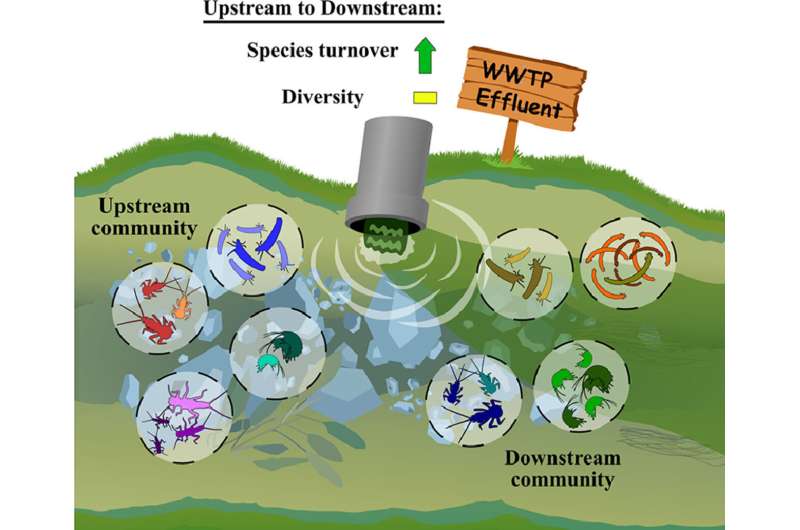This article has been reviewed according to Science X's editorial process and policies. Editors have highlighted the following attributes while ensuring the content's credibility:
fact-checked
peer-reviewed publication
trusted source
proofread
New study: Even treated wastewater affects our rivers

Effluents from wastewater treatment plants have a dual effect: Some species disappear, while others benefit. Especially certain insect orders, such as stonefly and caddisfly larvae, are decimated. Certain worms and crustaceans, by contrast, can increase in number.
A team from Goethe University Frankfurt led by Daniel Enns and Dr. Jonas Jourdan has corroborated this in a comprehensive study, which has now been published in the journal Water Research. They examined 170 wastewater treatment plants in Hesse in relation to species composition.
Wastewater treatment plants are an indispensable part of our modern infrastructure; they have made a significant contribution to improving the quality of our surface waters. However, their ability to completely remove what are known as micropollutants from wastewater is mostly limited.
These substances include, for example, active ingredients from pharmaceuticals and personal care products, pesticides and other synthetic substances enter waterbodies via the treated wastewater, placing an additional burden on rivers and streams. This exacerbates the challenges faced by already vulnerable insect communities and aquatic fauna.
Previous studies—which have primarily focused on single wastewater treatment plants—have already shown that invertebrate communities downstream of such effluents are generally dominated by pollution-tolerant taxa.
Until now, however, it was unclear how ubiquitous these changes are. That is why a team of biologists from Goethe University Frankfurt has now studied extensively how wastewater from 170 wastewater treatment plants in Hesse has an impact on the species composition of invertebrates.
This has prompted a change in the common conception that human-induced stressors reduce the number of species in a habitat and thus their diversity: Rather, the findings indicate that a shift in species composition can be observed. The researchers were able to identify significant shifts in the composition of the species community between sites located upstream and downstream of wastewater treatment plants.
Some species were particularly affected by effluents from wastewater treatment plants—such as stonefly and caddisfly larvae, which disappear entirely in some places. Other taxa, such as certain worms and crustaceans, by contrast, benefit and are found in greater numbers. This change can be observed especially in streams and smaller rivers. Overall, wastewater treatment plants alter conditions downstream to the advantage of pollution-tolerant taxa and to the disadvantage of sensitive ones.
How can we reduce water pollution?
Modern treatment techniques such as ozonation or activated charcoal filtering can make water treatment in wastewater treatment plants more efficient, allowing a wider range of pollutants, including many trace substances, to be removed from the wastewater before it is released into the environment.
Merging smaller wastewater treatment plants can also contribute to reducing the burden on the environment. Whatever measures are taken, it is important to make sure that upstream sections are not already degraded and are in a good chemical and structural condition.
More information: Daniel Enns et al, Flushing away the future: The effects of wastewater treatment plants on aquatic invertebrates, Water Research (2023). DOI: 10.1016/j.watres.2023.120388
Journal information: Water Research
Provided by Goethe University Frankfurt am Main




















